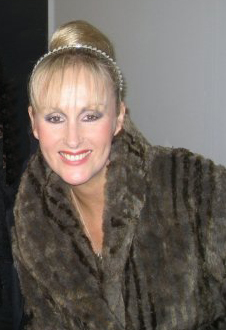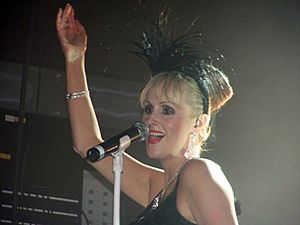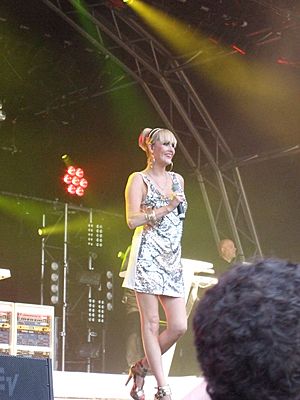Susan Ann Sulley facts for kids
Quick facts for kids
Susan Ann Sulley
|
|
|---|---|

Sulley in 2007
|
|
| Background information | |
| Also known as | Susanne Sulley Susan Ann Gayle |
| Born | 22 March 1963 Sheffield, South Yorkshire, England |
| Genres | Synth-pop |
| Occupation(s) | Singer |
| Years active | 1980–present |
| Labels |
|
Susan Ann Sulley (born 22 March 1963) is an English singer. She is one of the two female singers in the synth-pop band The Human League. She sang lead vocals on the famous song "Don't You Want Me" with the band's main singer, Philip Oakey.
Susan grew up in Sheffield, England. When she was 17, Philip Oakey, the band's leader, found her and her friend Joanne Catherall dancing in a nightclub called the Crazy Daisy. He asked them to join his band, The Human League, to sing.
Susan is a partner in The Human League band, which still makes music and performs today. Being a singer has been her only full-time job since she became an adult. She once said that she and Joanne just wanted to go to university, not be in a pop group.
Contents
Early Life and Joining The Human League
Susan Ann Sulley was born in Sheffield, UK, on March 22, 1963. She spent her early years in the Gleadless area of the city. She went to Frecheville Comprehensive School until mid-1981. Her best friend since age 13 was Joanne Catherall, who also lived in Sheffield.
In 1980, while still in school, Susan had a part-time job at a hair salon. She also had a summer job selling ice cream at a cinema. These were the only jobs she had besides her music career.
How Susan and Joanne Joined the Band
In 1980, The Human League band had some changes. Only two original members, Philip Oakey and Adrian Wright, remained. The band had a European tour starting very soon. Oakey needed new band members quickly to avoid problems with their record label, Virgin Records.
One evening, Oakey went to a Sheffield nightclub called the Crazy Daisy. He was looking for a female singer. He saw Joanne Catherall and Susan Sulley dancing. He thought they looked unique with their clothes, makeup, and dance moves. Oakey immediately asked both girls to join the tour as dancers and singers.
Joanne knew Oakey was famous in Sheffield, so she believed his offer was real. She and Susan already had tickets to see The Human League perform. They agreed to join right away, even though they had no singing or professional dancing experience.
Getting Permission for the Tour
Since the girls were 17 and 18, their parents had to agree to the tour. At first, their parents were not happy and said no. But Oakey visited both families. He convinced them that the girls would be safe. Their school also agreed to their absence, thinking the trip to Europe would be educational.
The Human League's first European tour began with Susan and Joanne. They were paid £30 a week. The tour was successful, but some fans were not happy. They had bought tickets to see the original all-male band. Joanne remembers people throwing beer cans at her. During the tour, Oakey was impressed with the girls' singing and their professional attitude.
Success with Dare and "Don't You Want Me"
In 1981, the group recorded Dare, their most successful album. This was also when music videos became very popular with the launch of MTV.
The "Don't You Want Me" Music Video
The song "Don't You Want Me" was released in November 1981. In its music video, Susan plays a successful actress leaving her former lover, played by Oakey. The video is set on a wet winter night during a "film shoot." Susan sings to the camera while walking through the scene, wearing a trench coat.
This song and its video became a huge hit for the group. It reached number one in both the UK and the US music charts. Susan was still in school when Dare was recorded. She often jokes that she has "never had a proper job in her life."
The Human League in the 1980s and 1990s
The band's huge international fame from Dare did not last forever. It took them three years to release their next album, Hysteria, in 1984. They also released a shorter album called Fascination! in America in 1983.
From these albums, the group had several top-ten songs in the UK and US. These included "(Keep Feeling) Fascination" and "Mirror Man". The song "Human" from the album Crash was their last big hit of the 1980s. It reached number one in the US and number eight in the UK. After this, the band's popularity decreased. Around 1986, Susan started using her birth name, Susan, instead of Susanne.
The mid-to-late 1980s were a difficult time for Susan. She had to deal with the challenges that came with being famous. There were also disagreements within the band. When asked about this time in 1995, Susan said she "hated the 1980s."
The 1990s and a Comeback
In 1990, the band released their last album with Virgin Records, Romantic?. It included the song "Heart Like a Wheel." This album did not bring back their huge success from 1981. Virgin Records decided not to continue their contract.
Even though things were tough, the group stayed together and worked on new music. The Human League made a surprising comeback in 1994. They signed with East West Records. Their single "Tell Me When" became a major hit, and the album Octopus sold very well.
"One Man in My Heart"
In 1995, the Octopus album gave the UK another hit song called "One Man in My Heart". This song featured Susan singing the main vocals, with Oakey and Joanne Catherall singing backup. The music video for the song was set in a Parisian café. It gave Susan a great chance to show her acting skills, similar to the "Don't You Want Me" video.
The song reached number thirteen in the UK charts. Years later, a newspaper called The Guardian described it as "one of the best love songs of the 1990s."
The 2000s to Today
The Human League continues to perform for large crowds around the world. In 2006, they played for 18,000 people at the Hollywood Bowl in the US. They also appeared on the TV show Jimmy Kimmel Live!. In late 2006, the band completed another tour in the UK and Europe, with many shows selling out.
In a 2007 interview, Susan said that the band's main goal was to record new music and possibly release a new album. They also planned to keep performing live in many places.
When asked in 2004 about the best part of her career, Susan said: "I think it's still happening. The fact we're still doing it now. After all these years – I'm 41 now, and really, I shouldn't be in a pop group any more, but I am and it's still my job! I wake up in the morning and I haven't got to go to a nine-to-five. I've got this life and I'm very, very lucky!"
Influence on Other Artists
Victoria Beckham from the Spice Girls has said that Susan Sulley inspired her to become a pop musician.
Professional Name Changes
Susan Ann Sulley's birth name is Susan Ann Sulley. However, she has used different names professionally over the years. The table below shows how her name has changed. Sometimes, journalists might use an older name because she rarely corrects them.
| 1963–1981 |
|
|---|---|
| 1981–1986 |
|
| 1986–2001 |
|
| 2001–2007 |
|
| 2007–present |
|
Awards and Recognition
- 1982 BRIT Awards – (as 'the Human League') – 'Best British Breakthrough Act'
- 2004 Q Awards – (as 'the Human League') – 'The Q Innovation in Sound Award'
- Nominated for Grammy Award in 1982 for Best International Act (as 'the Human League')
See also
 In Spanish: Susan Ann Sulley para niños
In Spanish: Susan Ann Sulley para niños
 | Delilah Pierce |
 | Gordon Parks |
 | Augusta Savage |
 | Charles Ethan Porter |



